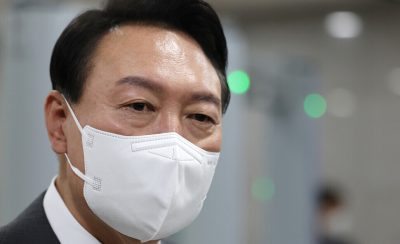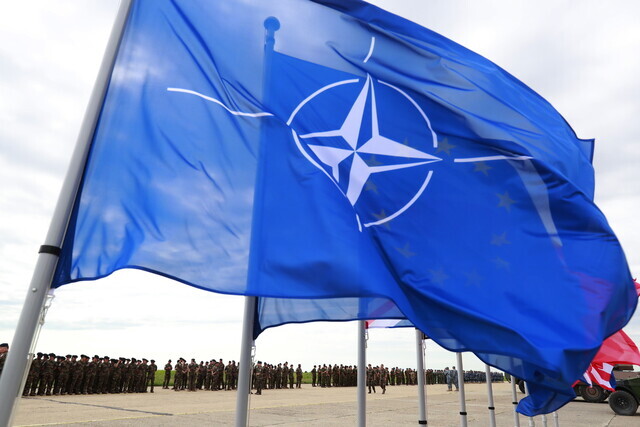“Global NATO”: Upcoming Summit Intended to Transform the “Atlantic Alliance”. New “Strategic Concept” Envisaged
Invitation in the Hands of ROK President Yoon Suk-yeol "Joking about Inexperience". South Korea’s attendance at the summit could have major ramifications for the global order – will Yoon rise to the occasion?

Special “partner nations” have been invited to the NATO summit to be held in Madrid, Spain, from June 29-30. In addition to the leaders of the 30 NATO member states, the leaders of South Korea, Japan, Australia, and New Zealand, the president of Ukraine, and the prime ministers of Sweden and Finland will also be in attendance.
The South Korean presidential office highlighted the significance of such an invitation when they announced on June 10 that President Yoon Suk-yeol would be “the first Korean leader to attend [a NATO summit] after receiving an official invitation from NATO.”
At home, attention is mainly focused on whether a Korea-Japan summit will be held on the sidelines of the NATO summit or whether the first lady, Kim Keon-hee, will accompany Yoon to Madrid. In reality, however, there is far more at stake at this summit.
The upcoming summit is intended to transform NATO, which has focused on European security since its founding in 1949 as a counterforce against the Soviet Union, into a global organization that responds to the “dual threats” of Russia and China.
At this summit, NATO will adopt a new “strategic concept” for the first time since 2010, the core of which concerns strengthening NATO’s military posture and expanding the scope of its activities to the Indo-Pacific region. In June of last year, NATO characterized China as presenting “systemic challenges” and declared that it would keep the expansion of China and Russia’s influence in check at the same time.
As China continues to defend Russia amid the latter’s invasion of Ukraine in February, European countries have grown increasingly wary of Beijing. With China continuously strengthening its military capabilities under the slogan of its so-called “dream of a strong military,” there is a growing consensus among the international community that the possibility of China taking Taiwan by force should be met with a joint response.
In this context, Yoon’s participation in the NATO summit is highly symbolic in its own right.
Currently, three developments are colliding in the international order. The first involves the US rallying its allies and partners to form a network of checks against China. It’s launched the Quad (alongside Japan, Australia and India), AUKUS (along with Australia and the UK), and the Indo-Pacific Economic Framework, and is promoting trilateral military cooperation between South Korea, the US, and Japan as well as strengthening the overall role of NATO.
In response, Chinese President Xi Jinping introduced the “Global Security Initiative” in April. With this initiative, China aims to resist US unilateralism, emphasizing the principles of non-interference in internal affairs, respect for sovereignty and territorial integrity. By strengthening cooperation with Russia and North Korea, China hopes to bolster collaboration among BRICS nations — Brazil, Russia, India, China and South Africa — as well. The goal is to effectively rally as many countries to stand on China’s side as possible in the South Pacific, Central Asia, South America, and the Middle East.
Finally, some countries like India and Saudi Arabia are taking advantage of their size and the leverage their oil and energy resources provide to tightrope walk between the two camps of the US and China.
It is difficult to predict what new order will emerge in the wake of the current turbulence of international affairs. We live in an era of uncertainty, one in which the post-WWII world order is faltering, meaning we cannot rule out the possibility of mass chaos and even war if the international community makes the wrong response.

Considering South Korea’s identity as a democratic, export-led manufacturing powerhouse and the challenges posed by North Korea’s nuclear and missile threats, there’s no doubt that South Korea is following the tide led by the US. Last year, former President Moon Jae-in attended the G7 summit and the Summit for Democracy — “a first for a Korean leader.” We at last find ourselves in an era where Korea is no longer able to pursue a foreign policy that seeks maximum gain while maintaining a balance between the US and China.
The problem, however, lies in the details. The diplomacy of the Yoon administration seems to be integrated with the overarching strategy of the US. It appears to lack any sort of custom strategy or approach that takes into South Korea’s unique abilities and geopolitical position.
During his campaign, Yoon stoked anti-Chinese sentiment in Korea with comments like, “The Korean people dislike China.” Ahead of the South Korea-US summit, Yoon even remarked that South Korea would join the Quad without considering the Quad’s delicate internal balance of power, but the US responded by saying they were “not considering” Korean membership for the time being.
Yoon also hurriedly announced he would be attending the NATO summit five days ahead of Japanese Prime Minister Fumio Kishida.
The US has characterized competition with China and Russia as a “confrontation between democracy and authoritarianism.” Indeed, we must stay vigilant when it comes to China and Russia tightening their repressive rule at home and pursuing a hierarchical order centered on great powers with the goal of restoring their empires abroad.
However, we must also stop to ask whether America’s democracy is functioning properly and whether the US’ promise to defend its allies will not be shaken by domestic political changes such as midterm or presidential elections.
While South Korea should play a role in preventing chaos in the international order and preventing armed conflicts on the Korean Peninsula and in Taiwan, it should also continue its efforts to create a buffer between the US and China.
In recent meetings with South Korea, Chinese diplomats have reportedly criticized US foreign policy in East Asia, defended North Korea and Russia, as well as called for South Korea not to interfere in Taiwan’s affairs and not to accept US strategic nuclear weapons on Korean soil.
This is China’s unyielding response to the pro-US foreign policy of the Yoon administration. Although South Korea should not give up on its own strategic goals out of fear of Chinese retaliation, measures should be taken to manage the difficult relationship with China and prepare for contingencies.
As such, South Korea’s overly US-oriented foreign policy and security teams should be stocked with more experts on Chinese affairs.
As the world’s sixth-largest military power and 10th-largest economy, South Korea has the power to shift the balance of the international order through its security cooperation with NATO. The question, then, is whether “first time as president” Yoon will be able to rise to the occasion.

